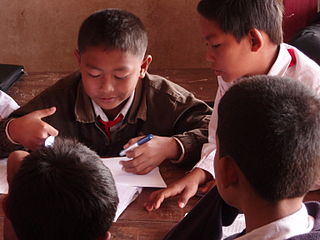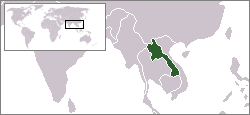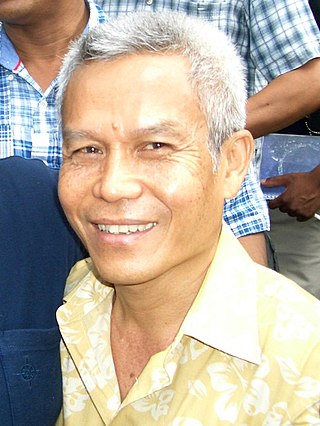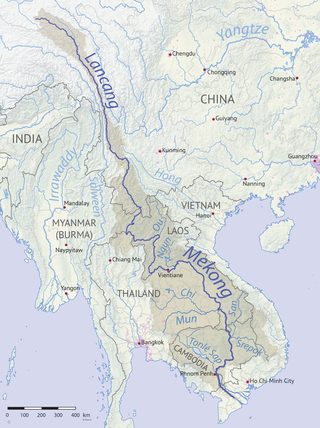
Laos, officially the Lao People's Democratic Republic, is the only landlocked country in Southeast Asia. It is bordered by Myanmar and China to the northwest, Vietnam to the east, Cambodia to the southeast, and Thailand to the west and southwest. Its capital and most populous city is Vientiane. The country is characterized by mountainous terrain, Buddhist temples including the UNESCO World Heritage site of Luang Prabang, and French colonial architecture.

Sisavang Vatthana or sometimes Savang Vatthana was the last king of the Kingdom of Laos and the 6th prime minister of Laos serving from 29 October to 21 November 1951. He ruled from 1959 after his father's death until his forced abdication in 1975. His rule ended with the takeover by the Pathet Lao in 1975, after which he and his family were sent to a re-education camp by the new government.

Beerlao is the generic name of a range of beers produced by the Lao Brewery Company (LBC) of Vientiane, Laos.

Theravada Buddhism is the largest religion in Laos, which is practiced by 66% of the population. Lao Buddhism is a unique version of Theravada Buddhism and is at the basis of ethnic Lao culture. Buddhism in Laos is often closely tied to animist beliefs and belief in ancestral spirits, particularly in rural areas.

The French protectorate of Laos was a French protectorate in Southeast Asia of what is today Laos between 1893 and 1953—with a brief interregnum as a Japanese puppet state in 1945—which constituted part of French Indochina. It was established over the Siamese vassal, the Kingdom of Luang Phrabang, following the Franco-Siamese crisis of 1893. It was integrated into French Indochina and in the following years further Siamese vassals, the Principality of Phuan and Kingdom of Champasak, were annexed into it in 1899 and 1904, respectively.

Operation Barrel Roll was a covert interdiction and close air support campaign conducted in the Kingdom of Laos by the United States military between 5 March 1964 and 29 March 1973, concurrent with the Vietnam War. During the operation, U.S. Air Force 2nd Air Division and U.S. Navy Task Force 77 dropped 260 million bombs on Laos.
Laotian Australians, also known as Lao Australians, refers to Australians who have either migrated from Laos and/or have Lao ancestry. The first Lao people that came to live in Australia arrived through the Colombo Plan in the 1960s, which gave a number of Laotians the opportunity to live and study in Australia. The migration of the Lao commenced with the Indochinese refugee crisis in 1975 following communist regime takeovers. According to the 2016 Census, there are 10,402 Laos-born Australians with the majority residing in New South Wales.

Relations between Laos and the United States officially began when the United States opened a legation in Laos in 1950, when Laos was a semi-autonomous state within French Indochina. These relations were maintained after Laos' independence in October 1953.

In 2005, the literacy rate in Laos was estimated to be 73%.

The Lao Issara was an anti-French, nationalist movement formed on 12 October 1945 by Prince Phetsarath. This short-lived movement emerged after the Japanese defeat in World War II and became the government of Laos before the return of the French. It aimed to prevent the French from restoring their control over Laos. The group disbanded in 1949.

Lesbian, gay, bisexual and transgender (LGBT) rights in Laos go unreported and unnoticed. While homosexuality is legal in Laos, it is very difficult to assess the current state of acceptance and violence that LGBTQ people face because of government interference. Numerous claims have suggested that Laos is one of the most tolerant communist states. Despite such claims, discrimination still exists. Laos provides no anti-discrimination protections for LGBT people, nor does it prohibit hate crimes based on sexual orientation and gender identity. Households headed by same-sex couples are not eligible for any of the rights that opposite-sex married couples enjoy, as neither same-sex marriage nor civil unions are legal.

Friends-International (FI) is an international social enterprise and registered non-governmental organization focusing on children's empowerment established in Cambodia in 1994. Its mission is "to build a future where all children are safe from all forms of abuse, are able to become productive citizens of their countries and contribute to a more equitable and sustainable world." FI works in Cambodia, Indonesia, Laos, Thailand and with almost 50 partners around the world, providing social services to marginalized urban young people and their families.

Big Brother Mouse is a not-for-profit publishing project in Laos.

The Lao government identified the need to equip citizens with the necessary skills and knowledge in the modern working environment. This has resulted in an improvement in the adult literacy rate. Based on the 2005 census, the literacy rate was recorded at 72.7%.
There is a large community of Vietnamese people in Laos. As Vietnam and Laos are neighbours, there is a long history of population migrations between the territories which today make up the two respective countries.

Sombath Somphone is an internationally acclaimed community development worker and prominent member of Lao civil society. Sombath was abducted from a Vientiane street in 2012 and has not been seen since.
The people of Laos have a rich literary tradition dating back at least six hundred years, with the oral and storytelling traditions of its peoples dating back much earlier. Lao literature refers to the written productions of Laotian peoples, its émigrés, and to Lao-language works. In Laos today there are over forty-seven recognized ethnic groups, with the Lao Loum comprising the majority group. Lao is officially recognized as the national language, but owing to the ethnic diversity of the country the literature of Laos can generally be grouped according to four ethnolinguistic families: Lao-Tai (Tai-Kadai); Mon-Khmer (Austroasiatic); Hmong-Mien (Miao-Yao), and Sino-Tibetan. As an inland crossroads of Southeast Asia the political history of Laos has been complicated by frequent warfare and colonial conquests by European and regional rivals.
General Sing Rattanasamay (1912–1973) was a Laotian senior military officer, being one of the co-founders of the Laotian National Army, the predessessor of the Royal Lao Army (RLA) during the First Indochina War and the Laotian Civil War. Initially a colonial police officer, Sing joined both the anti-Japanese resistance network during World War II, and the anti-French Lao Issara nationalist guerrilla movement from 1946 to 1949. He subsequently joined the ranks of the nascent ANL, and went on to serve the Kingdom of Laos until just prior to his death in 1973.

Laos is a nation with plentiful surface water and broad rivers, but outside of cities, water sanitation and accessibility infrastructure is sparse. Few improvements have been made since the end of the Laotian Civil War in 1975, especially compared to peer nations such as Thailand. By 2015, 76% of Laotians nationwide were estimated to have access to “improved” water, while 71% were estimated to have access to “improved” sanitation.
Cinema in Laos emerged later than in nearby Vietnam and Cambodia.













